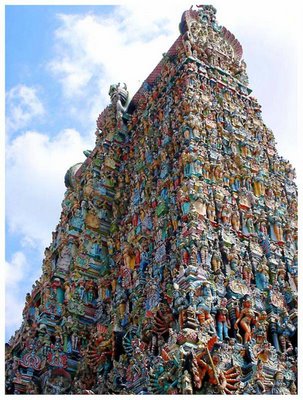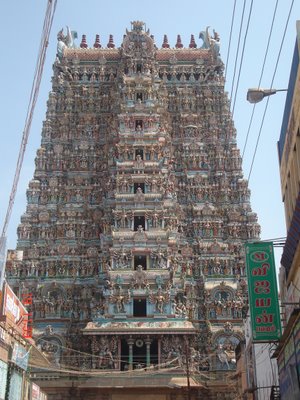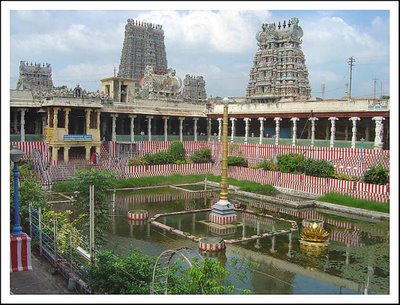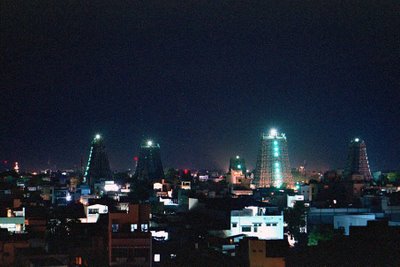Pun, called Silaydai or Iratura Mozhidhal - in Tamil, is one of the interesting things that could be often found in Tamil Literature. One poet famous for composing songs and poems with pun is the famous Kaalamega Pulavar (refer to my previous blog on the Power of Aram). His style and elegance in the usage of pun is quite remarkable. He is even attributed with the name "Silaydai Pulavar". His songs contain the liberal use of pun. Let us see one example for it, the song goes like this
"Mukkaaluk Kesamun Munnaraiyil Veezhamun
Akkaalarai Kandu Anjamun Vikki
Irumamun Maakaanikku Yegamun Kachi
Orumaavin Keezharaiyin Rodhu"
At the first reading of this song, the meaning might reveal that he has used all the unit of measurements in Tamil - Mukkaal - three-quarters; Arai - Half; Kaalarai - one-eighth; Iruma - one-tenth; Maakaani - one-sixteenth; Oruma - one-twentieth; Keezharai - 1/640
But the actual meaning of the song is that, let me paraphrase it later -
"Before you need a third leg (your walking stick).
Before your hair grows white due to age.
Before you fear the Lord of death (The yama).
Before you hiccup and cough to your death at the end.
Before the great earth to give you a place.
Go and Worship the Lord Shiva in the name Kachiappar residing under a mango tree in the place called Keezharai"
Now, let me paraphrase the song. Mukkaal is a word formed by merging syllables of Moondru (Three) + Kaal (Leg). Yesa means begging, yearning, longing etc; so Mukkaalukku Yesamun - Before you yearn for three legs. Narai means whitening of hair due to old age. Mun - means front, before, Veezhamun mean before falling into, so Munnaraiyil Veezhamun - Before your hair falls into whitening phase due to old age. Kaalar - means The lord of death (Yama), kandu means found, see. Anja means fearing; so Ak-kaalarai kandu anjamun - Before you see/find Yama and fear. Vikki verb form of Vikkal - Hiccup, Iruma verb form of Irumal - Cough, so Vikki Irumamun - Before you hiccup and cough before death. Maakaani mean vast or big earth where kaani means earth, Yega means going onto, getting a place; So Maakaanikku Yegamun - Before you get a place for you on earth after death. Kachi Orumavin Keezharaiyin Rodhu - this requires quite an explanation Kachi means - Lord Shiva with the name Kachiappar, Oruma is a combination of Oru (One) + Ma (Mango Tree), Keezharai - a place in Tamil Nadu. Odhu means praise, enchant, worship. As a whole the combined meaning is as above.
It is quite amazing see such eloquence and adeptness of Kaalamega Pulavar. Many of his songs are like this, will post them in my later blogs. But he is not all, there are quite a few incidents that involve pun.
Once, when there was a gathering of all great poets during the Sangam age. On that occasion, the two famous poets, Avaiyar and Kambar met. During such events, normally there will be question/answer sessions, debates, and song compositions held. Being such an event, Kambar used that opportunity to denigrate Avaiyar, and asked a question
"Ore Kaaladi, Naalilai Pandhaladi"
Normally, Adi is used to address females in derogatory tone or among friends or elderly people calling women. So Kambar felt happy that he addressed the elderly poet Avaiyar, the then great female poet, as Adi though not directly. But what Kambar meant to ask as a question in the song was to identify a plant, called Aarai that has one foot but four leaves. The Vallarai (Indian Pennywort - Biological name Centella asiatica) a relative of the Aarai family that is now used as a natural memory power enhancer and rejuvenator.
Lets see the paraphrase below,
Ore Kaaladi -- Ore - One; Kaal - Foot; Adi - base, the lowest part, the surface beneath something. So it means - Thing having One Foot at the base.
Naalilai Pandhal Adi -- Naal - four; Ilai - Leaf, Pandhal - Tent having only the roof. So meaning, The four leaves forming a tent beneath.
So Avaiyar on hearing Kambar calling her derogatorily, fumed into fury and repeated with the similar pun answering his question
"Saetrilae Mulaithu Irukkum Aanaal
Kokku Nikka Udhavadhu Adhu
Yaman Yerum Vaaganamae Unnum
Nee Aaraiyada Sonnaai"
the first meaning, the plant that would grow in mud, but will not be helpful for the small storks to stand on it. Only the buffalos will eat that and you said the Aarai.
the second meaning, like the meanest of the species that grow in the mud, without helping anything to stand on it and only the slothful creature like the buffalo likes it. Having such qualities like the above, whom did you call derogatorily?
Also Ada, Dei means a derogatory tone or used among friends or by elders to address men
Aarai is also used as an interrogative pronoun - Who. And this formed an interesting incident, where Kambar got paid back through the same coin (The Pun) by Avaiyar.
Similarly there was another gathering of poets for a grand feast with the King, where one poet named Vemburaar (Person from the land of Neem) rushed in late to only find that he had no place in the feast. And the King remarked funnily at the poet with a pun.
"Vembukku Ingu Idam Illai"
first meaning, Vembu means Neem tree which is an indication of bitterness, has no place in this happy and august gathering.
And the other meaning, Vemburar does not have a seat in the feast as he arrived late.
Then the poet's eloquence and brilliance showed up, he went straight to the King's seat and just pushed the King a bit and sat in that place saying
"Vembu endrum Arasudanae Irukkum"
first meaning, Vemburar will always be beside the King.
And the other meaning Vembu - Neem, Arasu - Peepul tree. In Hindu tradition it is considered as auspicious and sacred to have the Peepul and Neem grow beside each other. Implicitly means that Vemburar being beside the King is sacred.
There are more such interesting events throughout Tamil Literature.
More to come. Until then...

Saturday, March 18, 2006
Saturday, March 11, 2006
Amazing Madurai !!!
After quite sometime, posting the pics of the amazing temple at Madurai - The Meekashi Amman Temple. Exquisite, extra-ordinary grandeur, built by the early Tamilians. Enjoy!!!
Subscribe to:
Posts (Atom)















